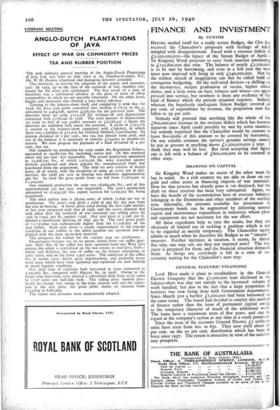FINANCE AND INVESTMENT
By CUSTOS HAVING steeled itself for a really severe Budget, the City has received the Chancellor's proposals with feelings of relLf mingled with disappointment. Faced with a revenue deficit of £2,200,000,000—the legacy of the Simon Budget of April-- Sir Kingsley Wood proposes to raise fresh taxation amounting to £125,800,000 this year. The balance of nearly £2,100,000 is to be met by borrowing, and even in a full year the new taxes now imposed will bring in only £240,000,000. Not by the wildest stretch of imaginafion can this be called bold or courageous budgeting. All the well-tried devices—a shilling on the income-tax, steeper graduation of surtax, higher estate duties, and a little extra on beer, tobacco and wines—are again pressed into service, but nowhere is there any evidence of the kind of finance which the present situation requires. Indeed, whereas the hopelessly inadequate Simon Budget covered 46 per cent. of expenditure by revenue, the proportion now has fallen to 39 per cent.
Nobody will pretend that anything like the whole of the £800,000,000 increase in the revenue deficit which has become apparent since April could possibly be met by extra taxation, but nobody supposed that the Chancellor would be content to leave five-sixths of this amount to be covered by borrowing. On any reliable estimate the nation's genuine savings cannot be put at present at anything above £1,500,000,000 a year. I think they may well be less. But even accepting that figure one is left with a balance of £600,000,000 to be covered in other ways.
DRAWING ON CAPITAL .
Sir Kingsley Wood makes no secret of the other ways he has in mind. As a rich country we are able to draw on our gold and other assets in financing imports of war materials. How far that process has already gone is liot disclosed, but the draft on these reserves has been very substantial. Again, we have the benefit of the accumulation here of overseas balances belonging to the Dominions and other members of the sterling area. Internally, the amounts available for investment in Government bonds can be augmented by deferring normal capital and maintenance expenditure in industries whose plant and equipment are not necessary for the war effort.
All these expedients help to ease the strain, but they are obviously of limited use in tackling a problem which is not to be regarded as merely temporary. The Chancellor tacitly admits as much when he describes his Budget as an " interim " measure. Further increases in taxation, it seems, lie ahead. But why, one may ask, are they not imposed now? The tax- payer is prepared for them, and the financial situation demands them. As things are, everybody is left in a state of un- certainty waiting for the Chancellor's next step.
GENERAL ELECTRIC FINANCING
Lord Hirst made it plain to stockholders in the General Electric Company that the £1,000,000 loan disclosed in the balance-sheet was due not merely to the increased volume of work handled, but also to the fact that a large proportion of business was now being done with Government departments. Since March 31st a further £1,000,000 had been borrowed on the same terms. The board had decided to employ this method of finance rather than the issue of permanent capital owing to the temporary character of much of the additional work. The loans have a maximum term of five years, and can be repaid at the company's option at any time at a small premium. Since the issue of the accounts General Electric Li ordinary units have risen from 62s. to 65s. They now yield about 61 per cent. on the 20 per cent distribution which has been in force since 1937. The return is attractive in view of the satisfac- tory prospects.






























 Previous page
Previous page